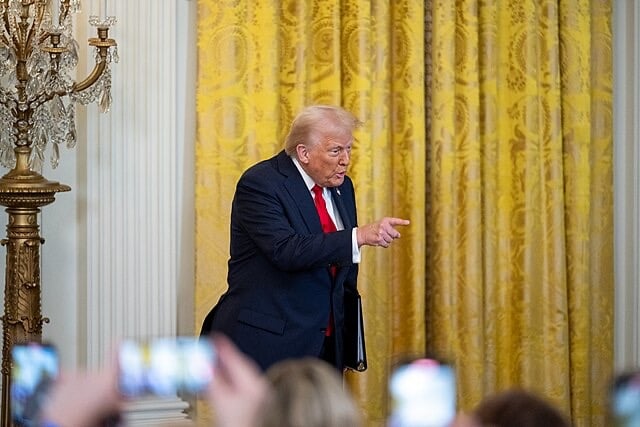The United States could be utilising migrant detention facilities in Rwanda that were funded by British taxpayers, the Shadow Home Secretary has claimed, as he defended the Conservative Party’s controversial deportation deal.
Chris Philp launched a robust defence of the Tories’ Rwanda scheme at a Conservative Party conference fringe event, arguing the cancelled programme cost only a fraction of Britain’s overall asylum spending. He revealed that Washington has now signed its own agreement with the Rwandan government to accept deported migrants.
“The USA are now using Rwanda, possibly even using the facilities we paid for, because Labour so foolishly cancelled that scheme just before it was going to start,” Philp told attendees at the Manchester gathering.
The Shadow Home Secretary’s comments highlight continuing Conservative anger over Prime Minister Sir Keir Starmer’s decision to scrap the Rwanda deportation programme on his first day in office. Starmer dismissed the policy as a gimmick that had failed to deliver results despite enormous expenditure.
Philp’s reference to American use of Rwandan facilities follows reports that emerged in August revealing the African nation would accept up to 250 migrants removed under President Donald Trump’s mass-deportation programme. The arrangement involves the United States paying Rwanda through a grant system to accept the transferred individuals.
When pressed to provide evidence for his claim that America might be using British-funded infrastructure, Philp acknowledged he was relying on media reports rather than confirmed intelligence. “It was reported that the US were doing that,” he explained.
The Shadow Home Secretary attempted to reframe the debate around the financial cost of the Rwanda scheme, which has been heavily criticised for its expense relative to the minimal number of deportations achieved. Labour has repeatedly highlighted that the Conservatives spent approximately £700 million on a deal that resulted in just four failed asylum seekers voluntarily relocating to Rwanda.
“In terms of re-implementation, clearly the Labour government, having very foolishly cancelled that scheme, has probably caused some of that money to be wasted,” Philp argued, seeking to shift blame for the financial loss onto the current administration.
He went on to contextualise the Rwanda expenditure within broader asylum system costs. “I would point out that the money spent on Rwanda, which ran into a few hundred million pounds, is a relatively small amount of money when compared to the multiple billions being spent on asylum,” Philp said.
This argument represents the Conservative Party’s attempt to defend one of its most controversial policies against sustained criticism from Labour, human rights organisations, and sections of the public who viewed the scheme as both morally questionable and financially wasteful.
The Rwanda deportation deal was central to the previous Conservative government’s strategy for deterring illegal Channel crossings. The theory held that if asylum seekers knew they would be sent to Rwanda rather than remaining in Britain, they would be discouraged from making the dangerous journey across the English Channel in small boats.
However, the scheme faced numerous legal challenges and never successfully deported a single asylum seeker involuntarily. The four individuals who did relocate to Rwanda did so voluntarily, accepting financial incentives to move rather than being forcibly removed as the policy intended.
Labour seized upon these failures during the general election campaign, portraying the Rwanda scheme as emblematic of Conservative mismanagement and poor value for money. The £700 million price tag became a powerful talking point for opposition politicians seeking to demonstrate fiscal irresponsibility.
Starmer’s decision to cancel the programme immediately upon taking office signalled his government’s rejection of the deterrent approach favoured by the Conservatives. Labour has instead pledged to tackle people-smuggling gangs and process asylum claims more efficiently whilst establishing stronger relationships with European partners.
The revelation that America has negotiated its own Rwanda deal adds an ironic twist to the saga. If the United States is indeed utilising facilities constructed or upgraded with British taxpayer money, it would mean Britain funded infrastructure that now serves American rather than British policy objectives.
Trump’s mass-deportation programme has been a centrepiece of his administration’s immigration policy, with the president promising to remove millions of undocumented migrants from the United States. The Rwanda agreement provides one potential destination for some of those facing removal.
For the Rwandan government, agreements with both Britain and America represent significant sources of revenue. The country has positioned itself as willing to accept migrants from Western nations in exchange for substantial financial payments, despite human rights concerns about conditions in Rwanda and questions about the appropriateness of wealthy nations outsourcing their asylum responsibilities.
Philp’s comments at the Conservative conference demonstrate that the party remains committed to defending its record on immigration despite electoral defeat. Senior Tories continue to argue that Labour lacks credible alternatives to the Rwanda deterrent model.
However, with the scheme now cancelled and only voluntary relocations ever achieved, the Conservative Party faces an uphill battle convincing voters that £700 million was well spent. The possibility that America might benefit from British-funded Rwandan facilities only adds to Labour’s narrative of Conservative waste and mismanagement.
Follow for more updates on Britannia Daily
Image Credit:
President Donald Trump hosts a Women’s History Month celebration at the White House (March 26, 2025) — photo by U.S. Department of Defense / U.S. Air Force (DoD Visual Information Division), licensed under CC BY 3.0



